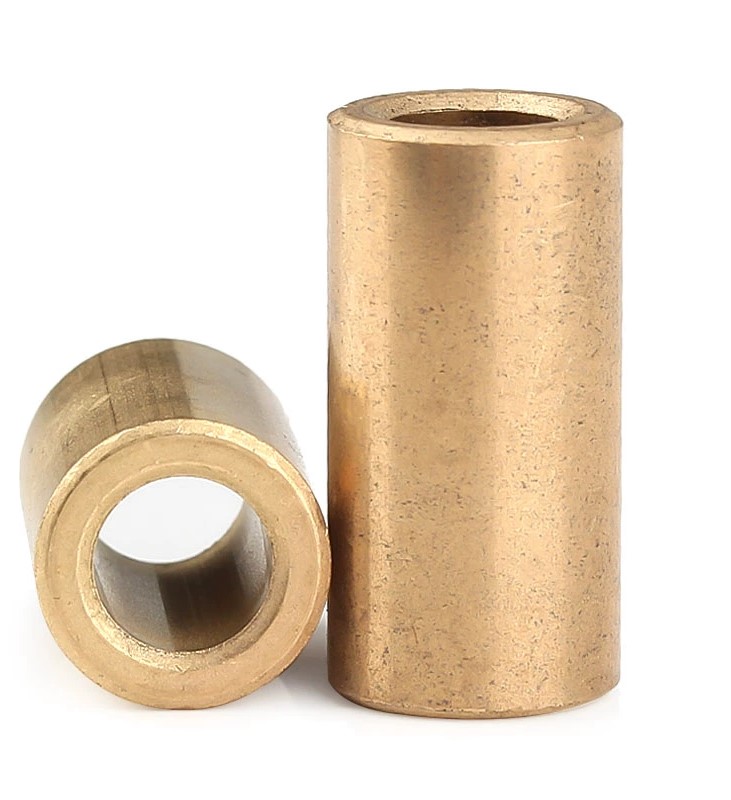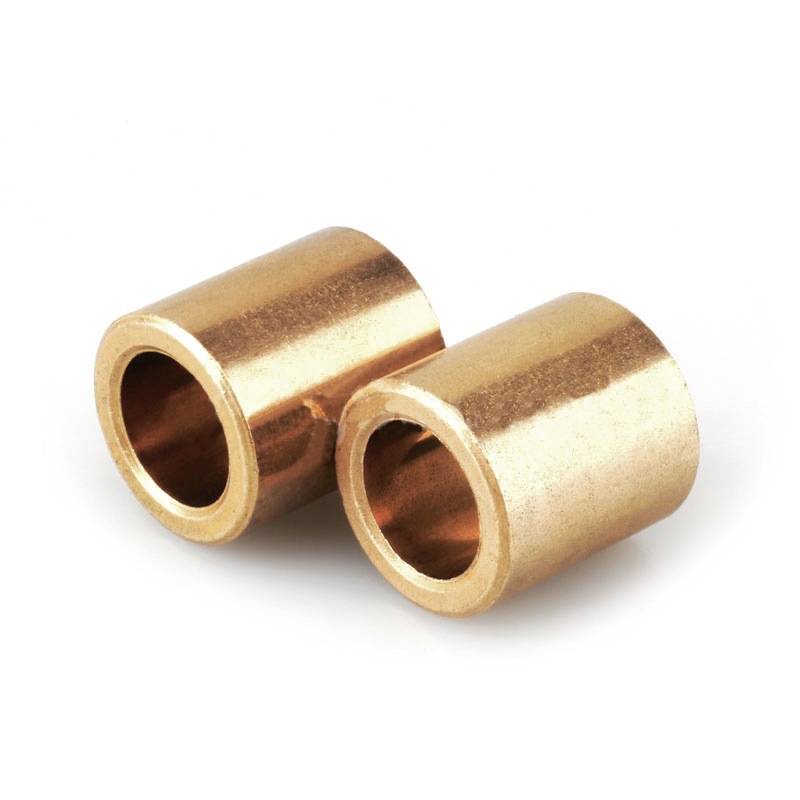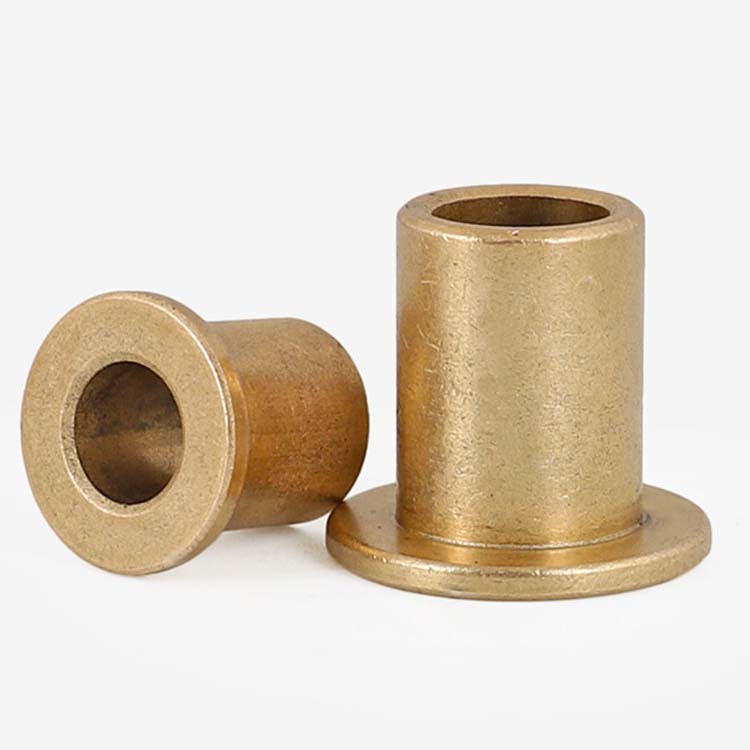Last Updated on October 21, 2024 by Chen
Key Takeaways
- Best Bronze Bushing Material: Selection depends on load capacity, wear resistance, corrosion resistance, and specific application requirements.
- Tin Bronze (C93200): Ideal for general industrial use with moderate loads and corrosion concerns.
- Manganese Bronze (C86300): Best suited for heavy-duty applications with high load capacity.
- Aluminum Bronze (C95400): Excellent for marine environments due to high corrosion resistance.
- Leaded Bronze: Known for machinability and good performance in applications with interrupted lubrication.
- Self-Lubricating Bronze: Contains lubricants to reduce friction without the need for external lubrication, making it maintenance-free.
- Application-Specific Recommendations: Choosing the right bronze depends on the operating environment and mechanical demands.
What is a Bronze Bushing?
A bronze bushing is a type of plain bearing used to reduce friction between rotating parts. These bushings are designed to handle various loads and are commonly found in industrial machines. Understanding which bronze bushing material suits your application is essential to ensure long-lasting performance.

Tin Bronze (C93200): The Versatile Option
Tin bronze, also known as C93200 or SAE 660, is one of the most popular bronze bushing materials. It boasts excellent wear resistance and antifriction properties.
- Applications: Common in light to medium load applications, particularly in environments where corrosion is a concern, such as marine applications.
- Advantages: High resistance to corrosion, especially dezincification, and good machinability.
In industrial applications, where a balance between durability and machinability is crucial, tin bronze is the go-to material.

Manganese Bronze (C86300): The Heavy-Duty Choice
Manganese bronze is well-known for its strength and durability, making it an excellent choice for heavy-duty applications.
- Applications: Used in marine equipment, steel mills, and earth-moving machinery.
- Advantages: This material offers excellent corrosion resistance and high load capacity, especially in low-speed applications.
If you’re working in industries where equipment endures high stress and heavy loads, manganese bronze is the best option.
Aluminum Bronze (C95400): The Marine Specialist
Aluminum bronze is designed for demanding environments, offering high strength and exceptional resistance to corrosion, particularly in seawater.
- Applications: Frequently used in marine hardware, such as propellers and ship components.
- Advantages: It stands out for its resistance to erosion and cavitation, making it perfect for use in harsh marine conditions.
For any application that requires long-term exposure to harsh environments, aluminum bronze is unbeatable.
Leaded Bronze: High Machinability
Leaded bronze contains lead, which makes it easier to machine while still maintaining good wear resistance.
- Applications: Found in pumps, gears, and machinery that experience intermittent lubrication.
- Advantages: Excellent load-carrying capacity and self-lubrication properties make it a versatile material for many industrial uses.
Leaded bronze is highly reliable when smooth operations and machinability are both important factors.
Self-Lubricating Bronze: The Maintenance-Free Option
Self-lubricating bronze bushings are embedded with solid lubricants such as graphite. This innovative design reduces friction without needing additional lubrication.
- Applications: Ideal for applications where it’s difficult to perform maintenance, like in remote or hard-to-reach areas.
- Advantages: Self-lubricating properties lead to lower maintenance costs and extended part lifespan.
If you are looking for a low-maintenance option that still performs well under tough conditions, self-lubricating bronze bushings are a great choice.

Factors to Consider When Selecting a Bronze Bushing
When choosing the right bronze bushing material, it is important to consider factors such as:
- Load Capacity: How much weight or pressure the bushing will bear.
- Wear Resistance: The ability of the material to resist abrasion and maintain its integrity over time.
- Corrosion Resistance: Especially important in marine environments or where the bushing is exposed to chemicals.
- Operating Speed: Some bronze materials perform better at lower speeds, while others can handle higher speeds without significant wear.
Why Tin Bronze is Often the Preferred Choice
For general industrial applications with moderate loads, tin bronze (C93200) stands out. Its balance of wear resistance, antifriction properties, and corrosion resistance makes it a versatile choice for a wide range of applications. Whether in bearings or bushings, tin bronze offers reliable performance without frequent replacement.
The High-Strength Benefits of Manganese Bronze
For industries that require bushings to handle extremely high loads and harsh working conditions, manganese bronze (C86300) is the top choice. Its superior strength and corrosion resistance ensure that it can withstand demanding environments for extended periods.
Aluminum Bronze for Extreme Conditions
If your application is exposed to seawater or other highly corrosive environments, aluminum bronze (C95400) is the ideal material. Its ability to resist corrosion, erosion, and cavitation makes it perfect for marine and chemical applications. From ship propellers to offshore equipment, this material excels in durability and longevity.
When to Use Leaded Bronze
Leaded bronze should be considered when machinability is a priority. In applications where interrupted lubrication may occur, such as gears or pumps, leaded bronze provides a good balance of machinability and wear resistance, ensuring smooth operations.
Self-Lubricating Bronze: The Future of Low-Maintenance Solutions
Self-lubricating bronze bushings represent a step forward in reducing maintenance costs. With embedded lubricants such as graphite, these bushings function without the need for external lubrication, making them perfect for hard-to-reach or high-maintenance areas. They are widely used in applications where consistent lubrication isn’t feasible.

Frequently Asked Questions (FAQs)
What is the best bronze bushing material for marine applications?
Aluminum bronze (C95400) is the best choice for marine applications due to its superior corrosion resistance and ability to withstand harsh seawater environments.
Which bronze material is ideal for high-load applications?
Manganese bronze (C86300) is perfect for high-load applications thanks to its exceptional strength and durability.
Can I use tin bronze in industrial applications?
Yes, tin bronze (C93200) is widely used in industrial applications with moderate loads. It offers a good balance between wear resistance and machinability.
What are the benefits of self-lubricating bronze bushings?
Self-lubricating bronze bushings reduce friction without needing external lubrication, making them ideal for applications where maintenance is difficult.
When should I use leaded bronze?
Leaded bronze is best used in applications that require high machinability, such as pumps and gears with intermittent lubrication.
For more detailed information, feel free to check out these bronze bushings and oil-impregnated bronze bushings options.

